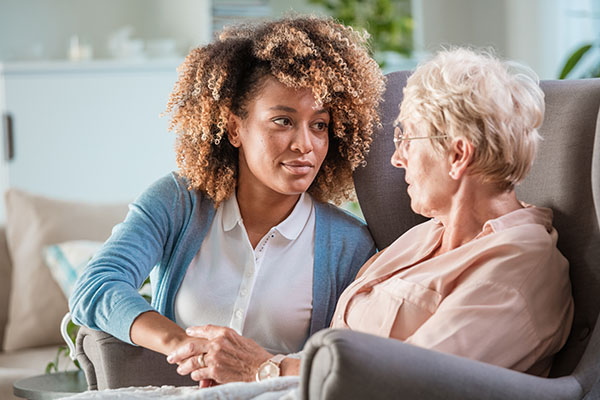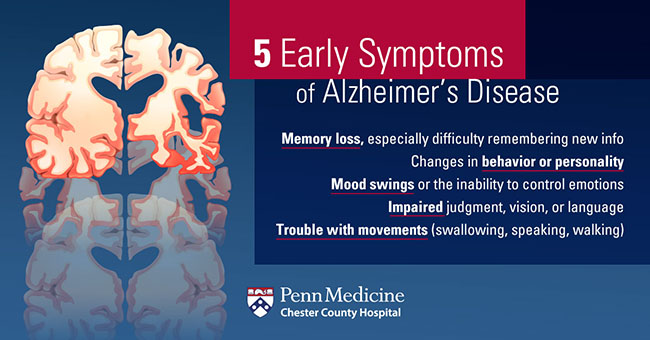
It can start small. A misplaced pair of reading glasses. An inability to retrace your steps. Difficulty recalling recent events or information. Sometimes it’s not about memory at all, but changes in emotions or physical ability.
But while the early warning signs may be small, the conversation about an Alzheimer's Disease diagnosis is not.

You may be familiar with Alzheimer's Disease from movies or books, as it is a prevalent condition in both media and the real world. Nearly 6 million people in the United States are living with Alzheimer’s, but the real reach of this disease is even wider — affecting family, friends, and loved ones.
Despite what you may know from popular portrayals of Alzheimer's disease — like in The Notebook — you may not feel prepared to have a conversation about a real-life diagnosis.
These conversations can be overwhelming, but they don’t have to be isolating. With the right information, these discussions can be both productive and supportive.
Telling Someone You Love That They Have Alzheimer's
If someone you love or care for has been diagnosed with Alzheimer’s, their diagnosis — especially if they don't know yet — can feel like a heavy burden.
You may feel conflicted about whether or not you should even tell your loved one about their Alzheimer's.
But there are many reasons why telling someone about their diagnosis can be the right choice:
- Life changes with an Alzheimer's diagnosis, and there are many options available for care and treatment. Knowing their diagnosis can help your loved one have autonomy in decisions about their care.
- Important legal and financial decisions often need to be made when someone is diagnosed with a disease like Alzheimer's. It can be difficult to take care of your loved one if you haven’t had conversations about finances and their accounts.
- Oftentimes, people who are diagnosed with Alzheimer's have a sense already that something is wrong. Understanding their diagnosis and what is happening to them can actually be a relief.
"When you have this conversation with your loved one, don’t feel like you have to do it alone. Include your loved one’s physician or provider so they can provide information about diagnosis, treatment, and care," says Pasquale Brancazio, DO, Neurologist at Penn Neurology.
Don't overload your loved one with information — unless they want it. Let where they are with their level of understanding guide how you approach talking about their diagnosis.
If nothing else, stay positive. Sometimes the best thing you can do is be present, tell your loved one that you are there for them, and will continue to be there for them. The conversation may become emotional, but your presence in the conversation is meaningful.
How to Tell Your Loved Ones About an Alzheimer's Diagnosis
Beyond telling someone about their own diagnosis, you may have to tell other people about a diagnosis.
You may be telling family members about your own diagnosis. You may have a conversation with a child about what's going on with grandma. Or maybe you want to tell a friend about the changes in your life as you care for an aging parent.
So when it comes time to tell someone – how should you go about it?
Here are 3 steps that can help guide your conversation.
1. Plan some of the things you want to say.
It can be difficult to speak under pressure, so planning your talking points out can calm your nerves and keep the conversation focused. Just reading more about Alzheimer's or how to have those tricky conversations about a diagnosis helps.
If you are telling someone like a caregiver about your own diagnosis, you may want to discuss future care options. On the other hand, if you're talking to a friend about an Alzheimer's diagnosis in your family, you may want to share how your life may change or how they can support you.
2. Choose a comfortable setting.
While planning what you want to say, pick a relaxing setting ahead of time. The definition of comfortable may depend on the person you are talking to or your relationship with them.
You may choose to invite them over for dinner or go for an afternoon walk together. When everyone feels comfortable and safe, you may find that the conversation feels more natural — or at least less overwhelming.
3. Leave space for questions.
No matter how much you prepare for a conversation, you can’t know exactly how it's going to go. Encourage your loved one to ask questions and answer them to the best of your ability.
Especially if you are telling a child or teen about an Alzheimer's diagnosis, they may have a lot of questions. When it comes to telling a teen that someone they love has Alzheimer's, they may feel sad or frustrated. They may wonder if your loved one will still recognize them. Giving them the space for honest inquiry can help them process their emotions and feel more in control during the conversation.
Reassuring your child that your loved one still loves them — even if they change or become more confused as a result of their Alzheimer's — can help calm some of their worries.
Taking Care of You — As Well as Your Loved One
One thing that can help you better support your loved one with Alzheimer's is self-care. Especially because you may not just be responsible for telling someone you love about their diagnosis — you may also be the one caring for them.
Self-care is a critical aspect of being a caregiver, and that is especially true for this particular disease — not all Alzheimer's patients are created equal. Some Alzheimer's patients may run away or become violent, and this can become stressful for caregivers.
Your feelings and frustrations are valid — even when it feels like you don’t have time for them.
To make self-care a part of your caregiving routine, you can:
- Join a support group for caregivers: Finding a community that understands what you’re going through can help you feel less alone.
- Start a journal: Writing about your experiences allows you to process, vent, and often focus. Alongside your frustrations, try to find things each day to be grateful for.
- Hang out with friends: When you're a caregiver, it can feel like it’s never about you. Make time to spend with friends, whether it’s a coffee date or zoom hangout.
And don’t hesitate to ask for help when you need it. As a caregiver or a loved one of someone with Alzheimer's, you can’t fully be there for them if you aren’t there for yourself, too.
Related Information from Chester County Hospital: